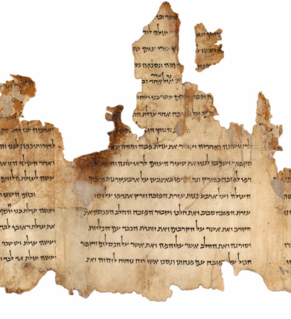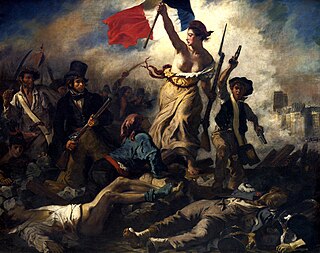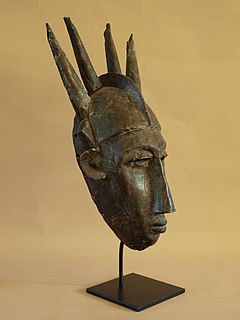
An epic poem is a lengthy narrative poem, ordinarily involving a time beyond living memory in which occurred the extraordinary doings of the extraordinary men and women who, in dealings with the gods or other superhuman forces, gave shape to the mortal universe for their descendants, the poet and his audience, to understand themselves as a people or nation.

Hebrew is a Northwest Semitic language native to Israel. In 2013, Modern Hebrew was spoken by over nine million people worldwide. Historically, it is regarded as the language of the Israelites, Judeans and their ancestors; however, the language was not referred to by the name "Hebrew" in the Tanakh itself. The Mishnah Megillah refers to the Hebrew language as Ashurit meaning Assyrian, which is a metonym derived from the name of the alphabet. The earliest examples of written Paleo-Hebrew date to the 10th century BCE. Hebrew belongs to the Northwest Semitic branch of the Afroasiatic language family, and is the only Canaanite language still spoken and the only truly successful example of a revived dead language, and one of only two Northwest Semitic languages still spoken, the other being Aramaic, which is spoken primarily by Christian Assyrians and Syriac-Arameans, the Gnostic Mandeans as well as some Near Eastern Jews.

A nation state is a state in which a great majority shares the same culture and is conscious of it. The nation state is an ideal in which cultural boundaries match up with political boundaries. According to one definition, "a nation state is a sovereign state of which most of its subjects are united also by factors which defined a nation such as language or common descent." It is a more precise concept than "country", since a country does not need to have a predominant ethnic group.
A nation is a stable community of people formed on the basis of a common language, territory, history, ethnicity, or a common culture. A nation is more overtly political than an ethnic group; it has been described as "a fully mobilized or institutionalized ethnic group". Some nations are ethnic groups and some are not. A nation has also been defined as a cultural-political community that has become conscious of its autonomy, unity and particular interests.

Romantic nationalism is the form of nationalism in which the state derives its political legitimacy as an organic consequence of the unity of those it governs. This includes, depending on the particular manner of practice, the language, race, ethnicity, culture, religion, and customs of the nation in its primal sense of those who were born within its culture. It can be applied to ethnic nationalism as well as civic nationalism. Romantic nationalism arose in reaction to dynastic or imperial hegemony, which assessed the legitimacy of the state from the top down, emanating from a monarch or other authority, which justified its existence. Such downward-radiating power might ultimately derive from a god or gods (see the divine right of kings and the Mandate of Heaven).

Tagalog is an Austronesian language spoken as a first language by the ethnic Tagalog people, who make up a quarter of the population of the Philippines, and as a second language by the majority. Its standardized form, officially named Filipino, is the national language of the Philippines, and is one of two official languages alongside English.

Western Christianity is one of two sub-divisions of Christianity. Western Christianity is composed of the Latin Church and Protestantism, together with their offshoots such as Independent Catholicism and Restorationism.

A lingua franca, also known as a bridge language, common language, trade language, auxiliary language, vehicular language, or link language, is a language or dialect systematically used to make communication possible between groups of people who do not share a native language or dialect, particularly when not one of the speakers' native languages.
The terms Hebrews and Hebrew people are mostly taken as synonymous with the Semitic-speaking Israelites, especially in the pre-monarchic period when they were still nomadic. However, in some instances it may also be used in a wider sense, referring to the Phoenicians, or to other ancient groups, such as the group known as Shasu of Yhw on the eve of the Bronze Age collapse, which, although not an ethnonym, appears 34 times within 32 verses of the Hebrew Bible.

The Bible has been translated into many languages from the biblical languages of Hebrew, Aramaic and Greek. As of September 2020 the full Bible has been translated into 700 languages, the New Testament has been translated into an additional 1,548 languages and Bible portions or stories into 1,138 other languages. Thus at least some portions of the Bible have been translated into 3,386 languages.

A sacred language, "holy language" or liturgical language is any language that is cultivated and used primarily in religious service or for other religious reasons by people who speak another, primary language in their daily life.

A vernacular, or vernacular language, is the speech variety a term generally used to refer to a local language or dialect, as distinct from what is seen as a standard language. The vernacular is contrasted with higher-prestige forms of language, such as national, literary, liturgical or scientific idiom, or a lingua franca, used to facilitate communication across a large area. The vernacular is usually native, normally spoken informally rather than written, and seen as of lower status than more codified forms. It may vary from more prestigious speech varieties in different ways, in that the vernacular can be a distinct stylistic register, a regional dialect, a sociolect, or an independent language.

Westernization (US) or Westernisation (UK), also Europeanization/Europeanisation or occidentalization/occidentalisation, is a process whereby societies come under or adopt Western culture in areas such as industry, technology, politics, economics, lifestyle, law, norms, mores, customs, traditions, values, mentality, perceptions, diet, clothing, language, alphabet, religion, and philosophy. During colonialism it often involved spread of Christianity.

Anglo-Americans are people who are English-speaking inhabitants of Anglo-America. It typically refers to the nations and ethnic groups in the Americas that speak English as a native language who comprise the majority of people who speak English as a first language. This usage originated in the discussion of the history of English-speaking people of the United States and the Spanish-speaking people residing in the western United States during the Mexican–American War.

Mandé is a family of ethnic groups in Western Africa who speak any of the many related Mande languages of the region. Various Mandé groups are found in Benin, Burkina Faso, Côte d'Ivoire, Gambia, Ghana, Guinea, Guinea-Bissau, Liberia, Mali, Mauritania, Niger, Nigeria, Senegal and Sierra Leone. The Mandé languages are divided into two primary groups: East Mandé and West Mandé.

The culture of Asia encompasses the collective and diverse customs and traditions of art, architecture, music, literature, lifestyle, philosophy, politics and religion that have been practiced and maintained by the numerous ethnic groups of the continent of Asia since prehistory. Identification of a specific culture of Asia or universal elements among the colossal diversity that has emanated from multiple cultural spheres and three of the four ancient River valley civilizations is complicated. However, the continent is commonly divided into six geographic sub-regions, that are characterized by perceivable commonalities, like culture, religion, language and relative ethnic (racial) homogeneity. These regions are Central Asia, East Asia, North Asia, South Asia, Southeast Asia and West Asia.

Literature broadly is any collection of written work, but it is also used more narrowly for writings specifically considered to be an art form, especially prose fiction, drama, and poetry. In recent centuries, the definition has expanded to include oral literature, much of which has been transcribed. Literature is a method of recording, preserving, and transmitting knowledge and entertainment.

The Western world, also known as the West, refers to various regions, nations and states, depending on the context, most often consisting of the majority of Europe, North America, and Australasia. The Western world is also known as the Occident, in contrast to the Orient, or Eastern world. It might mean the Northern half of the North–South divide. Western culture is commonly said to include: Australia, Canada, all European member countries of the EFTA and EU, the European microstates, New Zealand, the United Kingdom, and the United States.
Italophilia is the admiration, appreciation or emulation of Italy, its people, ideals, civilization and culture. Its opposite is Italophobia.















